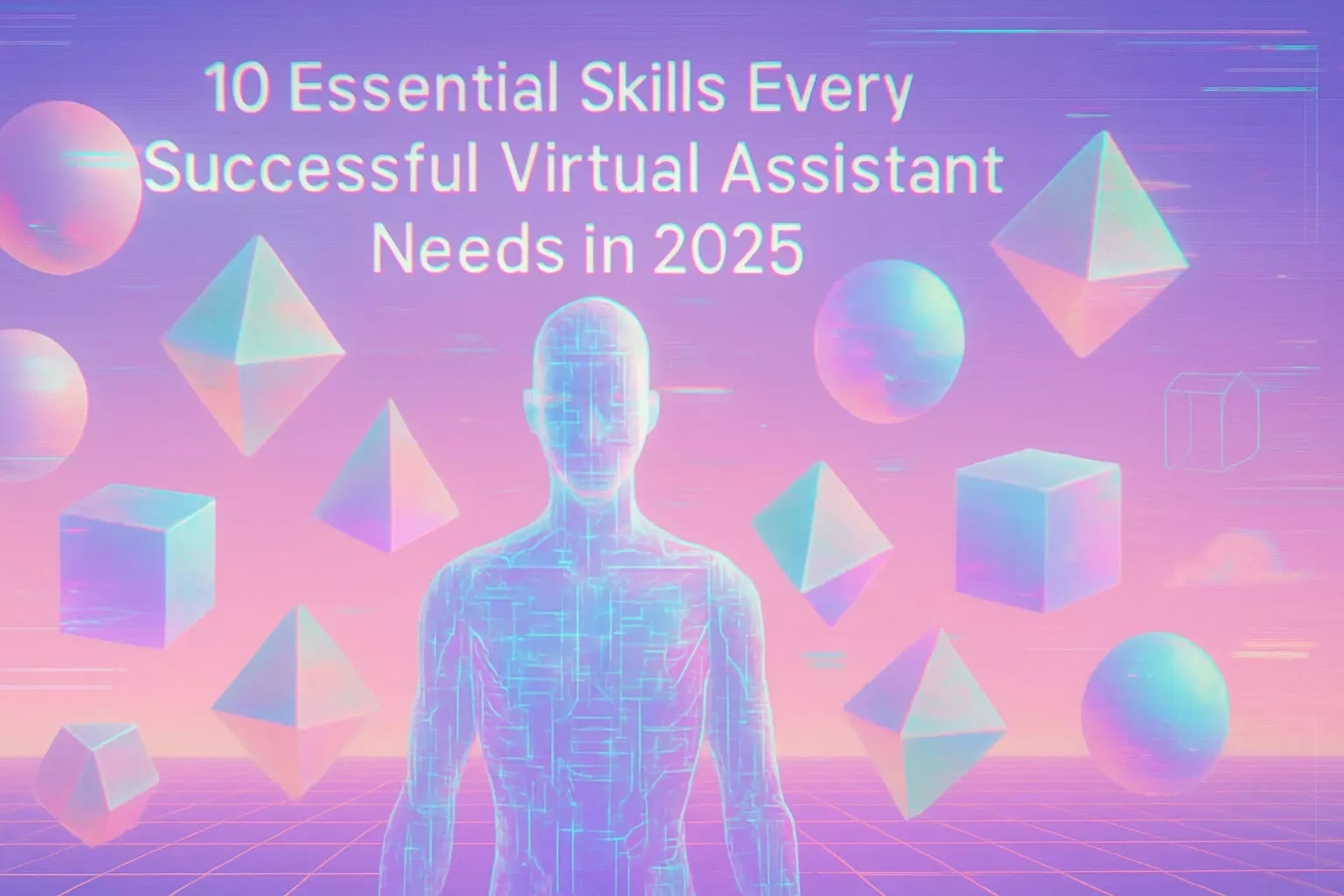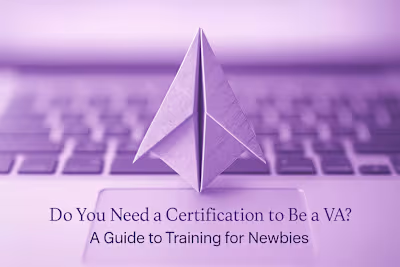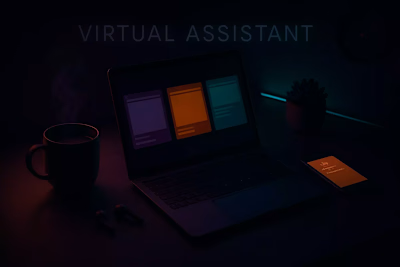10 Essential Skills Every Successful Virtual Assistant Needs in 2025

10 Essential Skills Every Successful Virtual Assistant Needs in 2025
Foundational Hard Skills for Every VA
Expert Email and Calendar Management
Proficiency in Project Management Software
Data Entry and Spreadsheet Management
In-Demand Technical and Creative Skills
Social Media Management
Content Creation and Repurposing
Basic Bookkeeping and Invoicing
Crucial Soft Skills for Long-Term Success
Proactive and Professional Communication
Adaptability and Problem-Solving
Reliability and Self-Discipline
Emotional Intelligence
Conclusion
References
10 Essential Skills Every Successful Virtual Assistant Needs in 2025
The virtual assistant market is absolutely exploding right now. Industry reports show the VA sector growing by double digits year over year, and that growth isn't slowing down anytime soon. But here's the thing - just being willing to work from home isn't enough anymore. You need real, marketable skills that make clients want to work with you.
Before diving into skill development, take a moment to consider if a VA career is right for you. It's not for everyone, and that's okay. But if you've decided this path fits your goals, then mastering these essential skills will help you stand out in an increasingly crowded marketplace. As you grow, you might even discover how specializing can skyrocket your VA career into something truly exceptional.
Let's be real - business owners who hire a virtual assistant aren't just looking for someone who can answer emails. They want a true partner who can take meaningful work off their plate. That means developing both technical abilities and the soft skills that make remote collaboration actually work.
Foundational Hard Skills for Every VA
Hard skills form the backbone of your VA service offering. These are the concrete, teachable abilities that clients scan for when reviewing your profile. Without them, you'll struggle to land even entry-level gigs.
Think of hard skills as your toolkit. Just like a carpenter needs to know how to use a hammer and saw, VAs need mastery of specific digital tools and processes. The good news? These skills are completely learnable, and most don't require expensive courses or certifications.
Expert Email and Calendar Management
Let me paint you a picture. Your client wakes up to 147 unread emails and three calendar conflicts for the day. This is where you become their hero. Email and calendar management might sound basic, but doing it well requires serious organizational chops.
Start with email. You're not just hitting "reply all" here. You need to understand how to create filters that automatically sort incoming messages. Learn to identify which emails need immediate attention versus what can wait. Draft responses that sound like your client wrote them. And always, always flag anything that seems urgent or unusual.
For calendars, it's about more than just booking meetings. You need to understand time zones (crucial for international clients), buffer time between appointments, and your client's personal preferences. Does your client need 15 minutes before video calls to prepare? Do they prefer morning meetings or afternoon ones? These details matter.
Pro tip: Create templates for common scheduling scenarios. Having a "Thanks for reaching out, here are three times that work" template saves everyone time and reduces back-and-forth emails.
Proficiency in Project Management Software
Gone are the days when VAs could get by with just email. Today's businesses run on project management platforms, and you need to speak their language fluently.
Asana, Trello, Monday.com, ClickUp - these aren't just fancy to-do lists. They're the central nervous system of modern businesses. When you understand these tools, you can jump into any client's workflow without missing a beat.
Here's what proficiency really means. You should know how to create projects, assign tasks, set dependencies, and track progress. You need to understand the difference between boards, lists, and cards in Trello versus projects, tasks, and subtasks in Asana. More importantly, you need to grasp the underlying logic of project management - how work flows from idea to completion.
Don't try to master every platform at once. Pick one or two popular ones and really dig deep. Most platforms share similar concepts, so expertise in one translates pretty well to others. Plus, many offer free versions perfect for learning.
Data Entry and Spreadsheet Management
I know, I know. Data entry doesn't sound glamorous. But here's the reality - businesses run on data, and someone needs to manage it accurately. That someone could be you, earning good money for detail-oriented work.
Basic data entry means more than just typing fast. It's about accuracy, consistency, and understanding data hygiene. Can you spot duplicate entries? Do you know how to standardize formats? Can you clean up messy data imports? These skills are gold.
But don't stop at basic entry. Level up with spreadsheet skills that actually wow clients. Learn VLOOKUP, pivot tables, and basic formulas. Know how to create charts that tell a story. Understand conditional formatting to make important data pop. When you can turn a wall of numbers into insights, you become invaluable.
Google Sheets is your best friend here. It's free, cloud-based, and most businesses use it. Start with simple formulas and work your way up. YouTube has thousands of tutorials - use them.
In-Demand Technical and Creative Skills
Once you've nailed the fundamentals, it's time to expand into specialized areas. These skills command higher rates because they directly support revenue-generating activities like marketing and sales.
The beauty of technical and creative skills? They're visible. Clients can immediately see the value when you improve their social media engagement or create eye-catching graphics. This makes it easier to justify premium pricing.
Social Media Management
Social media isn't just posting pretty pictures anymore. Businesses need strategic management of their online presence, and many are happy to outsource this time-consuming task.
Start with the basics. Understand each platform's unique culture and best practices. LinkedIn isn't Instagram, and TikTok isn't Facebook. Know optimal posting times, hashtag strategies, and what content performs best where.
But here's where you really add value - engagement. Responding to comments, managing DMs, and building community around your client's brand. This human touch can't be automated, making it a valuable service.
Learn to use scheduling tools like Buffer or Hootsuite. Understand basic analytics - what's a good engagement rate? How do you track follower growth? When you can show clients real metrics and improvement, you justify your value every month.
Quick win: Offer to audit a potential client's social media presence. Point out quick improvements like inconsistent branding or missed engagement opportunities. This positions you as an expert, not just an executor.
Content Creation and Repurposing
Content drives modern marketing, but creating it takes time most business owners don't have. That's your opportunity.
You don't need to be Shakespeare. Start with formatting and optimizing existing content. Can you take a blog post and format it beautifully in WordPress? Can you pull key quotes for social media? Can you turn a video transcript into a readable article?
Canva is your secret weapon here. This tool democratizes design, letting you create professional-looking graphics without years of training. Learn to make social media graphics, simple infographics, and presentation slides. Templates are your friend - customize them to match brand guidelines.
Repurposing is where you really shine. Take one piece of content and transform it into multiple formats. A blog post becomes five social media posts, an email newsletter, and slides for a presentation. This multiplication effect makes you incredibly valuable to content-hungry businesses.
Basic Bookkeeping and Invoicing
Money matters make many small business owners nervous. If you can handle basic financial tasks confidently, you become a trusted partner, not just an assistant.
You don't need an accounting degree. Start with the basics - tracking income and expenses, categorizing transactions, and preparing simple reports. Learn one accounting software really well. QuickBooks Online is popular, but Wave is free and perfect for learning.
Invoicing seems simple but doing it professionally makes a difference. Create clean, branded invoices. Set up automatic reminders for overdue payments. Track what's been paid and what's pending. When you help clients get paid faster, they'll happily pay you.
Important note: Always be clear about your limitations. Basic bookkeeping means data entry and simple reports, not tax advice or financial planning. Know when to recommend bringing in a real accountant.
Crucial Soft Skills for Long-Term Success
Here's a truth bomb - technical skills might get you hired, but soft skills keep you hired. In remote work, where you can't rely on office small talk to build relationships, these interpersonal abilities become even more critical.
Soft skills are harder to teach and harder to measure, but clients absolutely notice when they're missing. The good news? With conscious effort, you can develop these abilities just like any other skill.
Proactive and Professional Communication
Communication makes or breaks remote relationships. Period. You can't just wait for clients to ask how things are going - you need to proactively keep them in the loop.
What does great VA communication look like? First, it's consistent. Set expectations about when and how you'll update clients, then stick to it. Weekly email summaries work well. Daily Slack check-ins might be better for some clients. Find what works and be reliable.
Clarity is your other best friend. Write emails that are easy to scan. Use bullet points. Bold important dates or action items. Ask specific questions rather than vague "thoughts?" Always include next steps.
And please, please proofread. Nothing undermines professionalism faster than typos and grammar mistakes. Use Grammarly or similar tools if writing isn't your strength. Your communication represents your client - make it polished.
Adaptability and Problem-Solving
Business needs change fast. The project that was priority one yesterday might be scrapped today. The software you mastered last month might be replaced next week. Rolling with these changes gracefully sets great VAs apart.
Adaptability starts with mindset. Instead of getting frustrated when plans change, see it as normal business evolution. Ask clarifying questions. Suggest alternatives. Show that you're thinking about the bigger picture, not just checking boxes.
Problem-solving means not dumping issues back on your client's lap. Computer acting up? Try basic troubleshooting before asking for help. Can't access a file? Check obvious places first. When you do need help, come with solutions, not just problems.
Here's a framework that works: "I noticed X issue. I've tried Y and Z to resolve it. Would you prefer option A or B to move forward?" This shows initiative while still respecting your client's decision-making authority.
Reliability and Self-Discipline
In an office, showing up is half the battle. In remote work, no one sees you "show up." Your work output becomes the only measure of your reliability.
This means hitting deadlines. Every. Single. Time. If something might delay you, communicate early. "I'm running into some technical issues with the report. I can have it to you by 3 PM instead of noon. Does that work?" This beats radio silence followed by excuses every time.
Self-discipline goes deeper than just meeting deadlines. Can you resist the urge to check social media during work hours? Can you maintain focus when working from your couch? Can you say no to non-work activities during your committed hours?
Create structure for yourself. Set specific work hours. Use time-tracking tools. Take real breaks instead of half-working all day. When you treat your VA role like a real job, clients notice and respect it.
Emotional Intelligence
This might be the most underrated VA skill. Emotional intelligence means reading between the lines, managing your own reactions, and creating positive interactions even in stressful situations.
Start with self-awareness. Notice your triggers. Maybe you get defensive about feedback or anxious about new tasks. Recognizing these patterns helps you manage them professionally. Take a breath before responding to challenging emails. Sleep on it if needed.
Reading client emotions matters too. Is your usually chatty client sending short messages? They might be stressed. Did they just lose a big deal? Maybe hold off on asking for that raise this week. These nuances make you a trusted advisor, not just task support.
Empathy is your superpower. Put yourself in your client's shoes. They're juggling multiple priorities, probably stressed, and trusting you with important work. When you approach interactions with genuine care for their success, it shows in everything you do.
Conclusion
Building a successful VA career isn't about being perfect at everything. It's about developing a solid foundation of skills and continuously improving. Start with the basics - email management, project tools, and data skills. Add specialized abilities that interest you. Always prioritize the soft skills that make you a joy to work with.
Remember, every expert VA started exactly where you are. They learned one skill at a time, made mistakes, and kept improving. The virtual assistant industry needs skilled professionals now more than ever. With dedication to developing these essential abilities, you can build a thriving career that offers both flexibility and financial reward.
Your next step? Pick one skill from this list that excites you. Spend the next week learning and practicing it. Then move to the next one. Before you know it, you'll have the toolkit every successful VA needs to thrive in 2025 and beyond.
References
Like this project
Posted Jun 30, 2025
Want to become an in-demand virtual assistant? Master these 10 essential hard and soft skills to attract high-quality clients and succeed in 2025.












